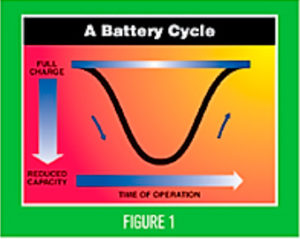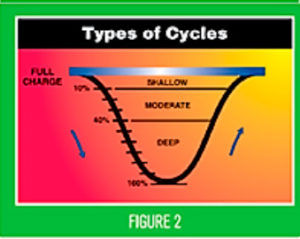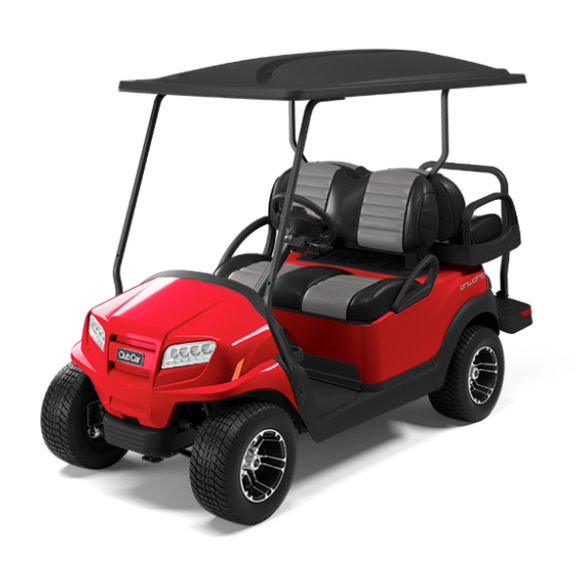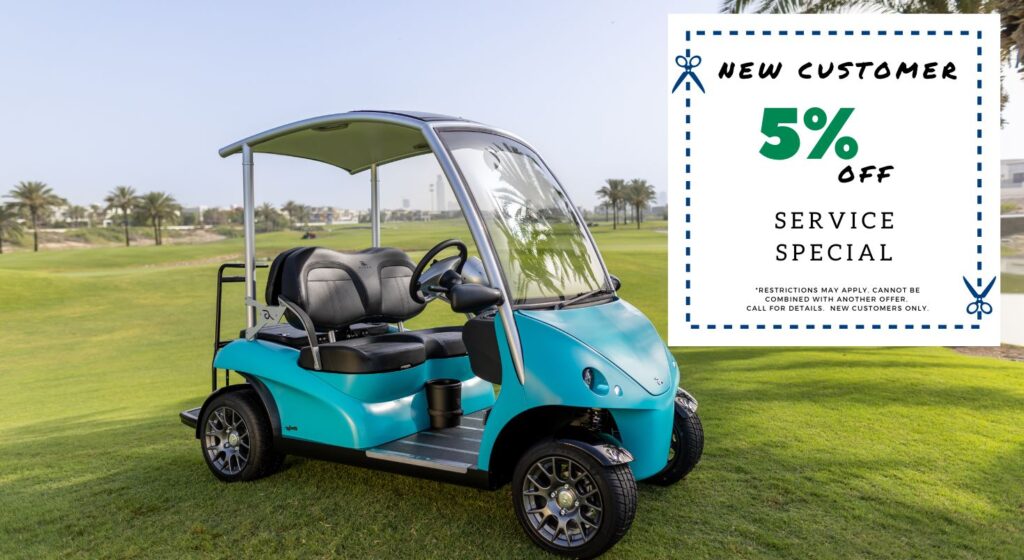Common Battery Questions
Request a quote or book a service call.
We are the largest golf car dealer in southern Arizona, with a huge car, batteries and parts inventory in four stores.
Call: 520-GOLF CAR
Batter FAQ - Things to know
Golf Cars of Arizona uses its buying power to negotiate the best pricing from battery suppliers in the Tucson area and beyond. This allows Golf Cars of Arizona to provide batteries for your golf car at the most competitive pricing available. We provide Trojan, Interstate, US Battery, and Roypow Lithium to fit your golf car and your usage needs. We offer the best deal around on batteries. We pick up your golf car, even if it’s dead, install the batteries, do a 10 point inspection including insuring your charger works, and return the car to you, all usually on the same day. We offer 12 month warranty on batteries if you pick up your batteries from us. If we install the batteries purchased from us we will warranty them for 12 months to 5 years (depending on the battery) from the purchase date as long as they are properly maintained. So why go anywhere else? Give us a call today and get the best deal on batteries and service around!!!,
Common Battery Questions
Stagnation occurs from battery inactivity and is extremely harmful to all lead-acid batteries. If seasonal storage is anticipated, we recommend the following:
- If possible, there is no better substitute than a friend or neighbor caring for your batteries in your absence. Have them check the water, drive the car, and charge the batteries once a month.
- The next best alternative to having friends(as regards your golf car batteries) is a maintenance charger. This device will monitor and charge, as required, the batteries during your absence. The issue we have found with automatic chargers that come with the golf cars originally and have a “storage” function is over-consumption of water due to charge rates and charge frequency. They can and will boil the batteries dry if not watched for water level during the off-season.
- If the two best options aren’t available, charge the batteries completely, fill water to proper level, and disconnect all primary battery connections. These include system +, -, and accessory wires. A diagram or photo before disconnecting wires is a good idea. Upon your return, reconnect all wires, water and charge batteries before use.
- Store the batteries/golf car in as cool a place as possible. Batteries will discharge when stored; the lower the temperature, the lower the self-discharge. If the batteries/car are stored in a hot garage it may be preferable to add water during the off-season but if not possible at least add water as needed upon your return and before using the car.
- When not in use during the season or off-season recharge the pack at least every two weeks and no less than once a month.
- Ask us about maintenance chargers and battery maintenance solutions for reducing water consumption.
The term “deep cycle” refers, in general, to a battery designed to to discharge to a relatively low voltage level, over and over, hundreds of times. This does not mean that you can or should ever discharge these batteries to near dead conditions. They DO NOT develop a “memory”! A 48 volt battery system, for example, may start with a voltage of 52 volts but is considered completely dead for practical purposes at 42 volts. You should always avoid very deep discharge to prevent damage to the cells. If you notice your golf car slowing down as you drive, because of voltage level, you are driving too far for your batteries.
- Battery chargers should be matched to fully charge batteries in an 8-hour period. Defective and mismatched chargers will damage batteries or severely reduce their performance.
- Avoid charging at temperatures above 120ºF (49’C) or ambient, whichever is higher.
- If needed. batteries should always be watered after charging unless plates are exposed before charging. If exposed, plates should be covered by approximately 1/4″ of electrolyte.
- Check acid level after charge. The acid level should be kept 1/2 way between the top of the plate and the bottom of the fill well in the cell cover.
- As batteries age, the maintenance requirements change. This means longer charging time and/or higher finish rate (Higher amperage at the end of the charge). Usually, older batteries need to be watered more often and the capacity decreases.
- Lead-acid batteries should be brought up to full charge at the earliest opportunity. Avoid continuously operating batteries in a partially charged condition. This will shorten battery life and reduce capacity.
- Deep-cycle batteries may need to be equalized periodically Equalizing is an extended, low-current and high-voltage charge performed after the normal charge cycle. This extra charge helps keep all cells in balance.
- New batteries should be given a full charge before use.
- New deep-cycle batteries will need to be cycled several times before reaching full capacity (30-80 cycles, depending on type). Capacity will be limited during this period. Discharge lower than 50% should be avoided.
- For best battery life, batteries should not be discharged below 80% of their rated capacity. Proper battery sizing will help avoid excessive discharge.
- New batteries will charge much longer than old batteries so don’t be surprised if your new batteries take longer to charge than you expect. If you are concerned about how long they charge of whether your charger is functioning correctly contact Golf Cars of Arizona and we can test your charger for free at any of our stores.
A cycle is one battery discharge and recharge of any depth (see Figure 1). The amount of battery discharge (in percent) compared to its full capacity determines the need for a shallow, moderate or deep cycle. This is appropriately called battery depth of discharge (DOD) and is expressed in percentages. For example, 40% DOD indicates that a battery has been discharged by 40% of its total capacity and has a 60% state of charge remaining.
There are three primary types of battery discharge cycles: shallow, moderate and deep. These terms help us understand the type of cycling batteries experience. Let’s take a look at all three types. Shallow cycles occur when only a small percentage of the total battery capacity is discharged. Moderate or deep cycles are discharged by a higher percentage of the battery’s total capacity (see Figure 2).

- Battery cables should be intact, and the connectors kept tight at all times. Always use insulated tools to avoid shorting battery terminals. Regular inspection is recommended.
- Vent caps should be correctly installed and tightened during operation and battery charging.
- Batteries should be kept clean and free of dirt and corrosion at all times.
- Water used to replenish batteries should be distilled or treated, not to exceed 200 TDS. (total dissolved solids parts per million). Particular care should be taken to avoid metallic contamination (iron).
- In situations where multiple batteries are connected in series, parallel or series/parallel, replacement batteries should be of the same size, age and usage level as the companion batteries.
- Extreme temperatures can substantially affect battery performance and charging. Cold reduces battery capacity and retards charging. Heat increases water usage and can result in overcharging. Very high temperature and overcharging can cause “thermal run-away” which may lead to an explosion or fire. If extreme temperatures are an unavoidable part of the application, consult a battery/ charger specialist about ways to deal with the situation.
We've got you.

40+ Years in Tucson
Service with a smile since 1980. We put our customers first. The most important thing a company has is its reputation.

Large inventory & parts
We are the largest golf car dealer in southern Arizona, with a huge car and parts inventory including club car. We have 4 store locations to serve you.

100% Satisfaction
We stand behind all our work and products, if something is not right, we will make it right. All of our technicians are factory Club Car trained.


